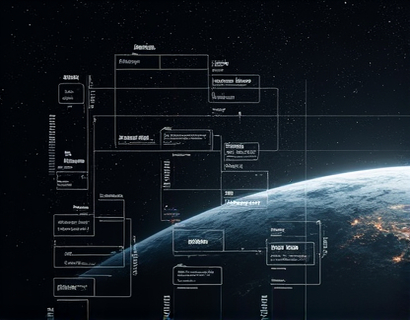Unlocking Market Success in Modern Ecosystems: Navigating Economic Prosperity and Opportunities
In the rapidly evolving landscape of global economics, understanding and navigating modern economic ecosystems has become crucial for professionals across various fields. This guide aims to provide strategic insights and detailed analysis to help economists, business leaders, investors, and industry experts capitalize on emerging market opportunities. By exploring the intricate dynamics of these ecosystems, we can better position ourselves to achieve economic prosperity and seize new opportunities.
Understanding Modern Economic Ecosystems
Modern economic ecosystems are complex networks of interconnected entities including businesses, consumers, governments, and technological platforms. These ecosystems are characterized by their dynamic nature, where innovation, collaboration, and competition drive growth and transformation. Unlike traditional economic models, modern ecosystems are fluid and adaptable, responding to changes in technology, consumer behavior, and global events.
The rise of digital technologies has been a significant catalyst for the evolution of these ecosystems. The internet, mobile devices, and big data analytics have transformed how businesses operate, how consumers interact, and how value is created and delivered. This digital transformation has led to the emergence of new business models, such as subscription-based services, sharing economies, and platform capitalism.
Key Drivers of Economic Prosperity in Modern Ecosystems
Several key drivers contribute to economic prosperity within modern ecosystems. Innovation is at the forefront, as continuous technological advancements and new business models create new markets and opportunities. For instance, the development of blockchain technology has opened up possibilities for decentralized finance, supply chain transparency, and secure data management.
Another critical driver is collaboration. In modern ecosystems, success often depends on the ability to form strategic partnerships and collaborate across boundaries. This includes collaborations between businesses, academia, and government entities to drive research and development, share resources, and address common challenges. Such collaborations can lead to breakthrough innovations and more resilient economic structures.
Consumer behavior also plays a pivotal role. The shift towards experiential consumption, sustainability, and personalized services has forced businesses to adapt and innovate. Understanding and aligning with these trends is essential for maintaining competitiveness and meeting consumer demands. For example, companies that prioritize sustainability not only appeal to environmentally conscious consumers but also contribute to long-term environmental health.
Opportunities in Modern Economic Ecosystems
The opportunities within modern economic ecosystems are vast and varied. One significant opportunity lies in the realm of digital transformation. Businesses that embrace digital technologies can enhance operational efficiency, improve customer experiences, and open up new revenue streams. For instance, leveraging artificial intelligence and machine learning can optimize supply chains, predict market trends, and personalize marketing efforts.
Another opportunity is the growth of emerging markets. As global economic power shifts, regions previously considered peripheral are becoming key players in the global economy. Investing in these markets can offer high returns and diversification benefits. However, it is crucial to understand the local context, regulatory environment, and cultural nuances to navigate these markets successfully.
Sustainability and social responsibility present another set of opportunities. Companies that integrate sustainable practices and corporate social responsibility into their core strategies can differentiate themselves in competitive markets. This not only attracts a growing base of conscious consumers but also aligns with regulatory trends towards environmental and social governance (ESG) standards.
Strategies for Navigating Modern Economic Ecosystems
To thrive in modern economic ecosystems, businesses and professionals must adopt a forward-looking and adaptive strategy. Here are some key strategies to consider:
First, foster a culture of innovation. Encourage experimentation, embrace failure as a learning opportunity, and invest in research and development. This mindset helps in staying ahead of the curve and identifying new market opportunities.
Second, build strong networks and partnerships. Collaboration can amplify capabilities and open up access to new markets and technologies. Engage with a diverse range of stakeholders, including competitors, to foster a collaborative ecosystem.
Third, prioritize data-driven decision-making. Leverage big data and analytics to gain insights into market trends, consumer behavior, and operational performance. Data-driven insights can inform strategic decisions and drive competitive advantage.
Fourth, focus on customer centricity. Understand and anticipate customer needs and preferences. Invest in customer experience and build strong relationships to foster loyalty and repeat business.
Finally, stay informed and agile. The pace of change in modern ecosystems requires a high degree of flexibility and responsiveness. Continuously monitor global trends, regulatory changes, and technological advancements to adapt quickly and seize new opportunities.
Case Studies: Success in Modern Ecosystems
Examining real-world examples can provide valuable insights into navigating modern economic ecosystems. One notable example is Tesla, Inc., which has revolutionized the automotive industry by combining electric vehicles with advanced technology and direct-to-consumer sales models. Tesla's focus on innovation, sustainability, and customer experience has enabled it to disrupt a traditional market and establish a strong brand presence.
Another example is Airbnb, which transformed the hospitality industry by leveraging digital platforms and peer-to-peer sharing. By addressing the need for affordable and unique accommodation options, Airbnb has created a global ecosystem of hosts and travelers, driving significant economic growth and innovation.
These case studies highlight the importance of innovation, customer focus, and strategic collaboration in achieving success within modern economic ecosystems.
Challenges and Risks
While the opportunities in modern economic ecosystems are compelling, there are also challenges and risks to consider. Rapid technological change can lead to obsolescence if businesses fail to keep up. Additionally, the increased interconnectedness of ecosystems can amplify risks, such as cybersecurity threats and supply chain disruptions.
Regulatory environments are also evolving, with growing emphasis on data privacy, antitrust, and environmental regulations. Companies must navigate these regulatory landscapes carefully to avoid compliance issues and reputational damage.
Furthermore, the competitive nature of modern ecosystems means that success is not guaranteed. Continuous innovation and adaptation are necessary to maintain a competitive edge.
Conclusion
Unlocking market success in modern economic ecosystems requires a deep understanding of the underlying dynamics and a strategic approach to navigating the opportunities and challenges. By fostering innovation, building strong networks, embracing data-driven decision-making, and maintaining a customer-centric focus, businesses and professionals can thrive in this dynamic landscape. As the global economy continues to evolve, staying informed and adaptable will be key to achieving economic prosperity and seizing new opportunities.










































